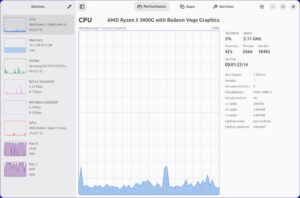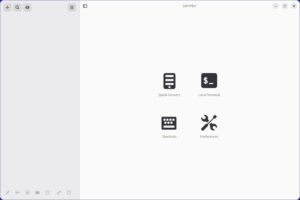Before using BeansBooks, be sure to take a look at its “open code” license, which is a free software license but incompatible with the GPL and all GPL compatible licenses, whether “copyleft” or “permissive.”
The Screening Room
Open software often reduces the barrier to entry for small businesses. FOSS fans might well have heard of personal and small-business accounting software GnuCash, which is taught in the Penn Manor School District in Lancaster, Pennsylvania and described in Charlie Reisinger’s book The Open Schoolhouse. Less well known is BeanBooks, an “open code” SaaS accounting program created by the well-known folks at System76, which came onto my radar just recently. This screencast review of the software does a good job showing you its features.
This follow-up video shows how BeansBooks can import bank account information.
To my mind, BeanBooks would be ideal for a high school or college entrepreneurship class to use. Have each student start their own small business and set up the accounting in BeanBooks. If this business happens to flourish, the student might continue using BeanBooks and use proceeds from the business to expand the capabilities of BeanBooks for their own particular business’ needs. Regardless of whether the business flourishes or not, students will have experience using the features of a robust accounting program.
It’s useful to note that although BeansBooks is a cloud-based open source accounting program, it is possible to install it on your own computer hardware, which is what high school and college entrepreneurship classes might opt for. This YouTube video explains those steps.
For the past 10 years, Phil has been working at a public library in the Washington D.C.-area, helping youth and adults use the 28 public Linux stations the library offers seven days a week. He also writes for MAKE magazine, Opensource.com and TechSoup Libraries. Suggest videos by contacting Phil on Twitter or at pshapiro@his.com.







This is not FOSS!
That is not a ‘free software’ license. It’s not even an ‘open source’ license.
I’d strongly recommend people look elsewhere and bypass this ‘open code’.
Hmm….seems a bit shady to me. I don’t trust anything that isn’t covered under one of the “major” Open Source Licenses….(GPL…LGPL…etc.) sometimes things might sound or look good, but it might not be worth the pitfalls further on down the road. Best to stick with GNUCash…..LibreOffice Calc….etc. I’m sure this will appeal to some…mainly the persons and entities mentioned in the article….but for someone like me?…who can’t afford to go to court over some licensing issue?…yeah..I’ll not be messing with it. Thanks for the info though…will definitely push the message out for all my peeps to avoid software like this.